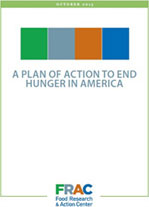The Earned Income Tax Credit (EITC) and Supplemental Nutrition Assistance Program (SNAP) are federally funded programs that bring more buying power for food and other necessities into low-income households. The annual EITC – and refundable child tax credit payments – refund families and individuals receive is most often used for household needs, such as food, paying down debt, and medical costs.
For the last 10 years, D.C. Hunger Solutions and D.C. Community Tax Aid have partnered on an EITC Volunteer Income Tax Assistance (VITA) Program campaign that also connects income-eligible residents to SNAP during tax season. The 2018 campaign will run until April 17 (tax day), with SNAP application assistance offered at five site locations across D.C. Research from the 2016 U.S. census found that food benefits, and refundable tax credits, such as EITC, lift more than 11 million low-income Americans out of poverty each year.
Applying for SNAP benefits can be a challenging and time-consuming task, especially if the applicant has an inflexible work schedule. Filing taxes is an equally time-consuming activity that can also be costly for cash-strapped households. IRS-certified volunteers help a range of low-income people, including people with disabilities and people with limited-English proficiency. The volunteers trained by D.C. Hunger Solutions provide information on the SNAP program and help tax filers complete the combined paperwork for benefits if they’re interested.
VITA tax sites are open evenings and weekends throughout the District, Maryland, and Virginia. D.C. Hunger Solutions is contracted with the local Department of Human Services (DHS) to provide education, technical training and application assistance for SNAP. Part of that work is submitting clients’ materials to an Economic Security Administration (ESA) caseworker, saving a days’ worth of time for the client. Last year, 760 people were pre-screened for SNAP eligibility at VITA tax sites.
Low-wage earners are likely to qualify for SNAP, but unlikely to participate. Long lines and filling out the application by hand are challenges for people with busy schedules. The combined application for means-tested benefits in D.C., which includes SNAP, is 16 pages in total. Physical copies of supporting documents, such as personal identification and rent receipts, must also be provided. This can be a challenge for any person applying for SNAP, but the working poor and seniors are hit the hardest by these barriers. In 2015, 38 percent of low-wage earners who were income-eligible for SNAP benefits did not receive them.
In 2014, the D.C. Council recognized the growing needs of low-wage earners and passed legislation strengthening the local EITC (providing benefits in addition to the federal EITC) by expanding income requirements for adults without dependents, increasing the EITC refund. Following the expansion, 10,300 more workers claimed the local EITC in 2015 and a total of $8.3 million went back to workers. In the same year, the SNAP Expansion Act of 2014 increased the minimum benefit and income requirements for SNAP eligibility.
Contact D.C. Hunger Solutions to learn more.
Hannah Kohanzadeh from the D.C. Fiscal Policy Institute contributed to this blog.



